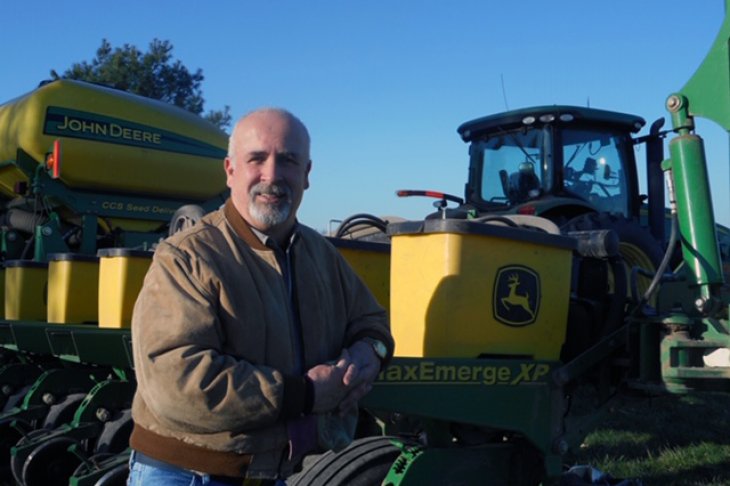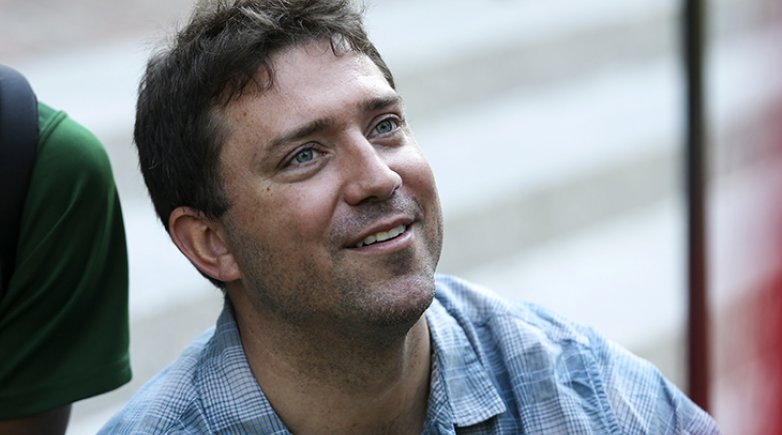John Warner

Agriculturalist invests in sustainability initiatives.
On a rolling farm in southern Illinois, gullies would form at the bottom of rain-soaked hills as precious topsoil eroded and washed away. Agricultural consultant John Warner ’72 and his farm manager had a solution.
They created land breaks and terraces to drain the water in a step-by-step process, replanted grass, and reseeded what was lost. It will become, Warner says, a natural waterway, working in concert with the environment that surrounds it. For Warner, it is his “raison d’être.” An ardent supporter of the Academy’s sustainability initiatives for more than 25 years, Warner has taken his lifelong love for farming and a pioneering mindset to successfully manage agricultural lands with an ethos of environmental stewardship.
“On most of the farms that we manage,” the founder of Moore & Warner Ag Group says, “we’re promoting conservation farming techniques. ... We want to apply the most innovative thinking and up-to-date science, and get the most food production from this land in harmony with stewardship and long-term farming ... so that a hundred years from now, people will still be living there, producing food and doing their part to feed the world.”
It’s no small feat in the face of a changing climate. Warner’s company, which provides farm management and consulting services to families and businesses in the U.S. and around the world, is based in the middle of America’s “breadbasket.” The Midwest is famous for its ability to feed this country, and the global population. It grows most of the corn and soybeans consumed in the U.S. and a large share of what is traded on the world’s markets. The erratic effects of climate change have increasingly impacted the ability of many farms to sustain their crop yields, or even remain in business, as more flooding, prolonged droughts and other weather eventsoccur alongside ongoing urbanization and farmland conversion.
Twenty years ago, Warner could see that these issues “were coming like a freight train,” he says. “Well, as you know, here we are, and they’re here.” In 2019, for example, more than 19 million acres of farmland in the U.S. went unplanted due to unusually high amounts of rain and snow, a record-setting year since the USDA began tracking the data in 2007.
Taking on 'the new'
Warner grew up in the farming community of Clinton, Illinois, before he attended Exeter. On the Academy’s inaugural Earth Day celebration in 1970, he recalls, “As a practical matter, nobody knew what to do with [it] the first time it came around.” He and his buddies were busy “outside communing with the earth” by way of Frisbee throwing. The day itself did not impact his life’s direction, but his Exeter education as a whole did. “Exeter [taught] me the willingness to take on ‘the new,’” he says. “[That] has a lot to do with this. Issues of caring for the earth and long-term stewardship [were] new issues, in a certain way, and ones that we socially [had] not given a lot of consideration to.” Warner developed a keen ability to see things from different perspectives and consider the impact his own actions might have on any outcomes.
After he graduated from the Academy and earned a bachelor’s degree in English from Dartmouth College, he returned to Illinois and to the farming communities that he loved, becoming the fifth generation of his family to work in the John Warner Bank of Clinton. After rising to the role of bank chairman and CEO, a position he held for 10 years, Warner became a trustee for the C.H. Moore Trust Estate, where he managed farm properties across six Midwestern states. In 2000, he founded his company, Moore & Warner. By then, he was actively supporting the Academy’s efforts to promote concepts of environmentalism and resource management within its community.
Warner’s support of The Exeter Fund expanded to include a historic gift of sorts: a donation to the Gifford Pinchot Fund, established in 1913 by its namesake, a legendary conservationist and class of 1884 alumnus. The fund awards a small cash prize in the spring to a student who has demonstrated an interest in environmental conservation. Warner’s great-grandfather had served in Theodore Roosevelt’s administration alongside Pinchot, the country’s first U.S. Forest Service chief, and was good friends with the man.
Cultivating leadership
Warner has since become a consistent champion of Academy programs that expand sustainability education curriculum and reduce the school’s environmental impact. During Principal Emerita Kendra Stearns O’Donnell’s tenure, for example, Warner collaborated with faculty members to create a cross-disciplinary educational series for students on emerging topics, including environmental law and sustainable land management. He even traveled to Exeter to share with students his real-world knowledge of American agriculture and its history.
“To a certain extent, we could make the argument that Exeter kids, a certain number of [them], are going to be world leaders,” he says. “Personally, I’m more interested in the efforts of individuals ... in Exonians becoming thoughtful, educated stewards of the earth and doing the best they can on their own efforts. That, actually, is how we make change. It’s incremental. It’s citizen-based. It’s good sense and good-judgment-based. That’s the side of the education program that I wanted to emphasize.”
He reinforced that commitment in 2015 by establishing the John Warner, Class of 1972, Sustainability Initiatives Fund, which now serves as the primary source of support for Exeter’s annual Climate Action Day programming. Over the past three years, Warner’s generosity has enabled the school to invite world-renowned experts in the fields of climate change and environmental sustainability to speak to the community. His fund has also provided students with opportunities for off-campus field work, such as dune-grass planting, visits to local farms, and invasive-species removal.
Warner becomes more animated as he thinks about the educational possibilities for Exeter students today. “The sky’s the limit on this one,” he says. “In every way, it’s time for other generations to get involved.”
— Karen Ingraham


